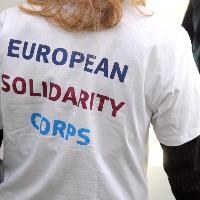(BRUSSELS) – EU education ministers agreed a legal framework Monday for the new European Solidarity Corps – which provides opportunities for young people to volunteer or work in community projects at home or abroad.
Over 41,000 young people have already signed up for the European Solidarity Corps, an EU initiative designed to create opportunities for young people to volunteer or work in projects in their own country or abroad that benefit communities and people around Europe.
The Council has responded positively to the idea of the European Solidarity Corps, first mooted by Commission president Jean-Claude Juncker in his State of the Union address in 2016.
In May this year, the Commission put forward a proposal to equip the European Solidarity Corps with a single legal base, its own financing mechanism and a broader set of solidarity activities.
Following in-depth discussions on the Commission’s proposal, the Council has agreed its position and hopes to finalise an agreement with the European Parliament as soon as possible.
The main elements of the Council agreed text are:
- The ESC will be open for people aged 18-30 from the European Union; acceding, candidate and potential candidate countries, EFTA and EEA agreement countries, Switzerland and countries of the European neighbourhood policy.
- A wide range of solidarity activities will be proposed, including volunteering, traineeships, jobs and youth-led solidarity projects.
- It will offer the chance to support public and private entities active in strengthening cohesion, solidarity and democracy in Europe, for example by addressing social exclusion, poverty, health or working on the reception and integration of refugees.
- It will be based on good practices of existing programmes, mainly the European Voluntary Service.
- The overall budget will be based on 100% redeployments of heading 1a which means various existing programmes.
For the second phase of the ESC, to take place under the new legislation, the Commission has proposed a budget of EUR 341.5 million to cover the period 2018-2020. The objective is to see the first 100,000 young Europeans taking part in ESC activities by 2020.
Today’s agreement by Member States paves the way for a final agreement with the European Parliament.
European Solidarity Corps – full text of the general approach
Q&A: European Solidarity Corps dedicated legal base and budget (May 2017)



